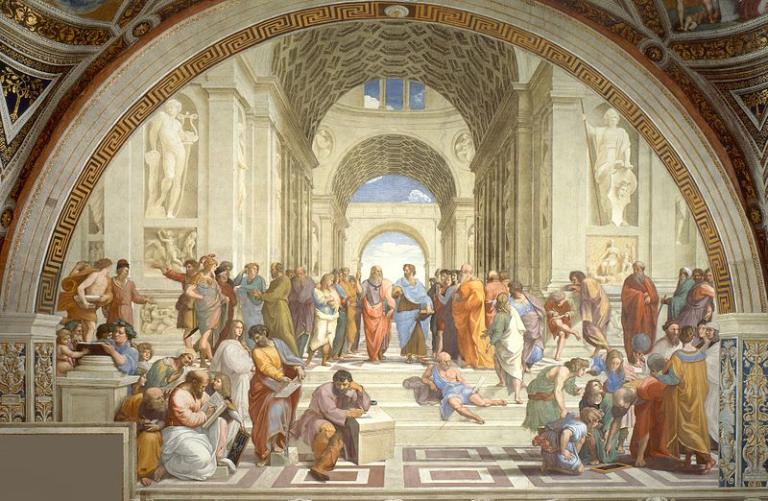
In this painting, located in the Vatican Apartments, Plato (the older bearded man, shown gesturing upwards) walks with his younger student, Aristotle (who motions downward, suggesting how his philosophical approach would come to differ from his master’s). In the foreground, Michelangelo sits, looking downward, resting his head on his fist. Over toward the right border of the painting, the very young Raphael himself, wearing a black beret-like hat, looks directly at the viewer. (Wikimedia Commons public domain)
Another three passages from the admirable book by Fiona Givens and Terryl Givens, The Christ Who Heals: How God Restored the Truth that Saves Us:
Christianity . . . soon veered sharply away from the parent-child relationship articulated by Christ in the New Testament. In lieu of a God who walked in the Garden with Adam, Clement of Alexandria was describing a God “not then in space, but above space and time and name and conception.” In the Western Church, the trend was more pronounced. “Neoplatonic thought,” a blend of Greek philosophy and Eastern mysticism, “had affirmed the inaccessibility of God to the human mind, [and] viewed this inaccessibility as the result of the fallen character and of the soul.” Philosophy’s influence soon overwhelmed the anthropomorphism of Genesis. The North African Tertullian agreed that God was invisible, incomprehensible, and inconceivable. The problem that emerged in the wake of such a God was now considerable: “On the one hand, God must be utterly transcendent, unchanging, incorporeal, invisible, beyond the grasp and description of . . . intellect. But, as God is also thought of as the provident, benign creator and ruler of all that is good, the question arose: how is God to reveal and achieve his benevolent, saving purposes when his transcendence makes it impossible for him to communicate with anything beyond himself?” (19)
The result caused twentieth-century theologian Nikolai Berdyaev to lament that “the God whom official theology tends to construct has no profound relationship with men; he is turned to stone and man is humiliated.” (21)
Compare, on this theme,
“Might as well pray to a rock”
and
“Reconsidering the emotions of God”
One can understand, reading these lines, why God would have condemned such creeds to the boy prophet Joseph. For they declare our Heavenly Father to be arbitrary, fickle, as content to damn as to save, all-controlling and manipulative. He foreordains to damnation, without reason or recourse. (And it is not because he foresees some will sin; the creed expressly states his decrees are “without any foresight of faith” or of wickedness.) Furthermore, these particular creeds emphasize his total independence from human concerns, human suffering, human conceptions of fairness, or human yearning to understand him. HIs counsels are “unsearchable,” and his concern is only with “his own will.” The accompanying catechism refers to his “fervent zeal for his own worship” and “his revengeful indignation” of incorrect forms of worship. As for his pity or compassion or grief felt on our behalf, “these things are no more than . . . certain figures of speech, with which even schoolboys are acquainted.” (24)












